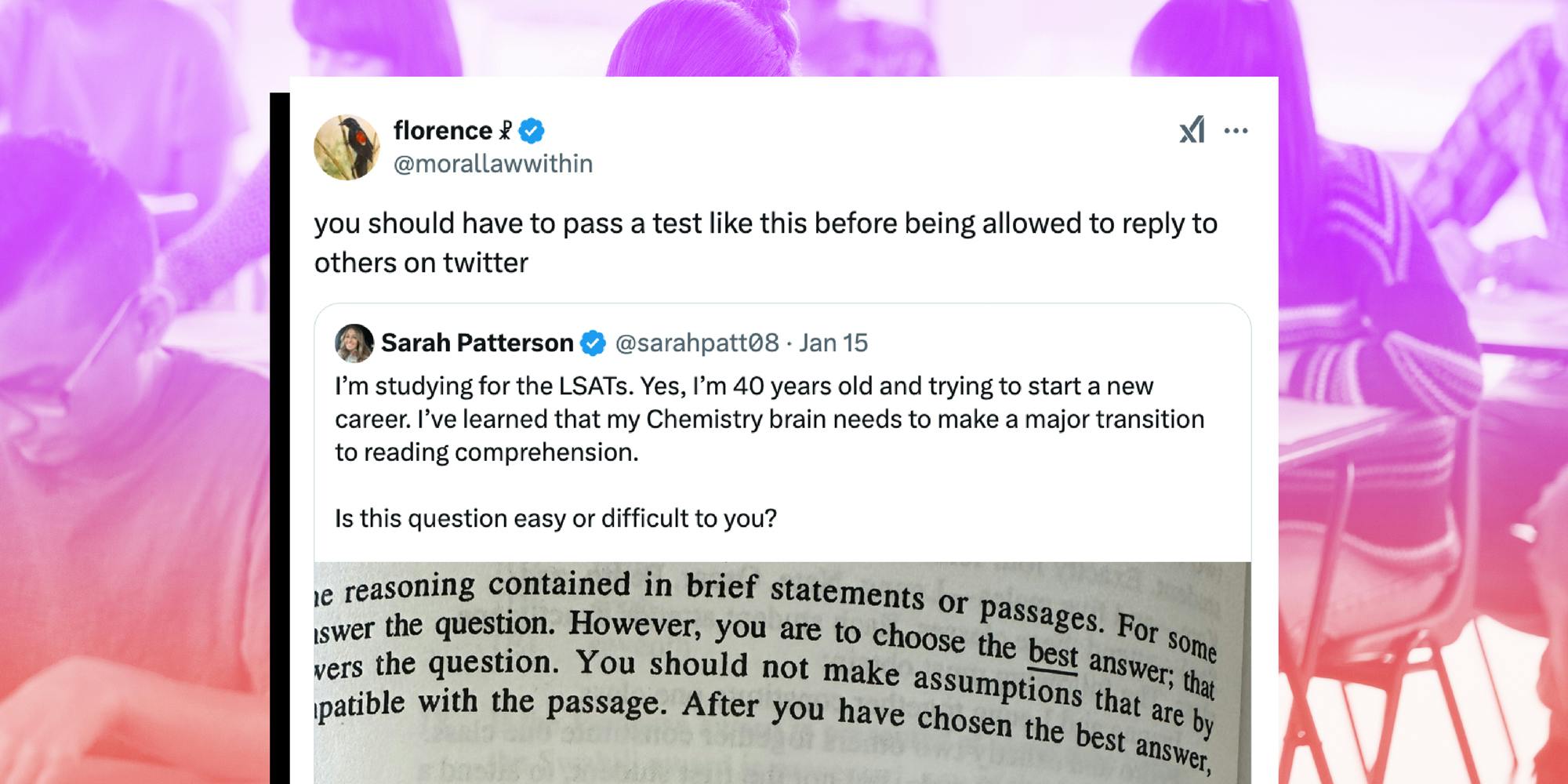‘Is this question easy or difficult to you?’: This LSAT reading comprehension question is breaking brains

Discussion around the correct answer to an LSAT reading comprehension question is saying a lot about how discourse goes wrong on X. On Wednesday, one user studying for the Law School Admission Test (LSAT) struggled with one of her practice questions and posted a screenshot to the app to find out if she was the only one who found it challenging.
Commenters confidently gave several different answers and argued with each other as the week progressed. Meanwhile, those who got the answer easily came to realize something about their struggles with other people on social media.
Could you pass a law school reading comprehension test?
On Jan. 15, X user @sarahpatt08 posted a photo of a practice LSAT question, suggesting that she was unsure of the answer and hoped for validation that it wasn't obvious.
"I’m studying for the LSATs. Yes, I’m 40 years old and trying to start a new career. I’ve learned that my Chemistry brain needs to make a major transition to reading comprehension," she wrote. "Is this question easy or difficult to you?"

The question asks the reader to choose a statement "most strongly supported" by a passage about physical education.
"Physical education should teach people to pursue healthy, active lifestyles as they grow older. But the focus on competitive sports in most schools causes most of the less competitive students to turn away from sports. Having learned to think of themselves as unathletic, they do no exercise enough to stay healthy."
Potential answers to this question include:
- (A) Physical education should include noncompetitive activities.
- (B) Competition causes most students to turn away from sports.
- (C) People who are talented at competitive physical endeavors exercise regularly.
- (D) The mental aspects of exercise are as important as the physical ones.
- (E) Children should be taught the dangers of a sedentary lifestyle.

In a response to a commenter, Sarah Patterson confirms that the correct answer is A—a conclusion supported and explained by LSAT hacks. If you picked something else, you're far from the only one. If you're baffled how anyone could get it wrong, you're also in good company.
'People are so confidently wrong'

Those in that second group expressed alarm not only at how many people got the question wrong, but how self-assured they were in their wrongness. A lot of users declared that the answer is B or D with full confidence, without saying "I think" or "probably" or using other qualifiers often added by those who got it right.

"LSAT questions state explicitly that you have to only use the information given to provide an answer," said @pourfairelevide. "That kind of strictly self-contained interpretation is the opposite of Twitter-brain free association, and it’s really bad and scary that so many people are so bad at it."

Reading comprehension tests measure a person's ability to take only the information given in a passage and pick a conclusion most supported by the text, without making assumptions or pulling from knowledge they had from other sources. The number of X users who struggled with this explained a lot to those who find online discourse so frustrating.
"I've been thinking about this all day and the fact that people are so confidently wrong in their response when it's not a very difficult question if you really read it and have good reading comprehension clears up so much up for me about the way people respond on Twitter," wrote @clhubes.

'So you hate waffles?'
As people debated the answer and had their own moments of comprehension, the original post went viral, gaining over 11.7 million views. This guaranteed a good number of joke responses, especially among those who remember the 2017 pancakes vs. waffles tweet.
This post, from user @BravoCoolee, made a point about average X user reading comprehension without drawing directly from the LSAT.

"Twitter the only place where well-articulated sentences still get misinterpreted," they complained. "You can say 'I like pancakes' and somebody will say 'So you hate waffles?'"
"No b*tch. Dats a whole new sentence. Wtf is you talkin about."
This beloved tweet is so relevant to the LSAT discourse that lawyer Frank Bednarz created his own reading comprehension question based on it.

Others shared LSAT questions deemed to be harder than the one about physical education, prompting further discussion.

Are the LSATs difficult?
Don't feel too bad if you struggled with the question. As a graduate school test, the LSAT is generally considered to be harder than the SAT, and plenty of people struggle with test taking in general.
The LSAT is like the SATs but for law school, as the name suggests. These schools use LSAT scores to assess the risk level of failure to graduate for each applicant. Out of 180 questions, the average test taker from 2010 to 2023 got 153 correct, leaving them at low to moderate risk according to LawHub.
Many law school hopefuls also retake the test, seeking a higher score. Applicants are allowed to take the test up to three times per year, and schools often look only at the highest score out of all attempts. Plus, most test takers spend months studying and practicing. The Princeton Review recommends 250 to 300 hours of preparation before taking the test.
The internet is chaotic—but we’ll break it down for you in one daily email. Sign up for the Daily Dot’s web_crawlr newsletter here to get the best (and worst) of the internet straight into your inbox.
Sign up to receive the Daily Dot’s Internet Insider newsletter for urgent news from the frontline of online.
The post ‘Is this question easy or difficult to you?’: This LSAT reading comprehension question is breaking brains appeared first on The Daily Dot.